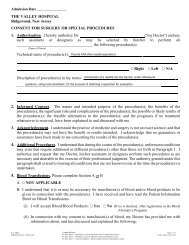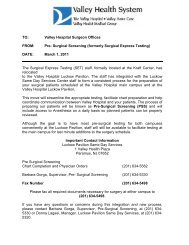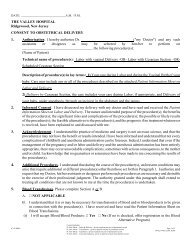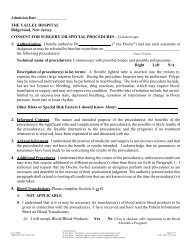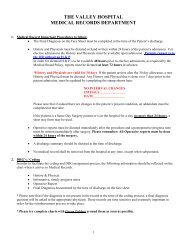hipec - Valley Blumenthal Cancer Center
hipec - Valley Blumenthal Cancer Center
hipec - Valley Blumenthal Cancer Center
You also want an ePaper? Increase the reach of your titles
YUMPU automatically turns print PDFs into web optimized ePapers that Google loves.
A PATIENT’S GUIDE TO<br />
HIPEC<br />
HYPERTHERMIC INTRAPERITONEAL<br />
CHEMOTHERAPY<br />
The HIPEC Program at The <strong>Valley</strong> Hospital’s Daniel<br />
and Gloria <strong>Blumenthal</strong> <strong>Cancer</strong> <strong>Center</strong> is New Jersey’s<br />
only comprehensive program and the largest among<br />
hospitals in the metropolitan New York/New Jersey area.<br />
Our Director of Surgical Oncology, Lawrence E. Harrison,<br />
M.D., heads our HIPEC Program and has more experience<br />
in performing HIPEC than any other physician in the area.<br />
Over the past 11 years, he has used HIPEC to treat more than<br />
100 select patients with advanced abdominal and gynecologic<br />
malignancies.<br />
WHAT TYPE OF FOLLOW-UP CARE<br />
WILL I REQUIRE?<br />
Generally, you will see Dr. Harrison one week after surgery<br />
and again about two weeks later. Additional follow-up<br />
appointments will be scheduled every three to four months.<br />
Some patients may benefit from post-operative systemic<br />
chemotherapy, depending on the tumor type and if any tissue<br />
remains after surgery.<br />
Dr. Harrison’s office is located in the Daniel and Gloria<br />
<strong>Blumenthal</strong> <strong>Cancer</strong> <strong>Center</strong> at the Luckow Pavilion in<br />
Paramus. To make an appointment or for more information,<br />
call 201-634-5547 or visit www.valleyhealth.com/HIPEC.<br />
Information on hotels and shuttle services is available on<br />
our web site at www.<strong>Valley</strong>Health.com/HIPEC. You may<br />
also call Reception Services at 201-447-8000, ext. 2250,<br />
at the times that follow for this information: Monday<br />
through Friday, 5 a.m. to 8:30 p.m.; Saturdays from 6 a.m.<br />
to 8:30 p.m.; and Sundays from 9 a.m. to 8:30 p.m.<br />
A PATIENT’S GUIDE TO<br />
HIPEC<br />
HYPERTHERMIC INTRAPERITONEAL<br />
CHEMOTHERAPY<br />
Lawrence E. Harrison, M.D.,<br />
is Director of Surgical Oncology at<br />
The <strong>Valley</strong> Hospital’s Daniel and<br />
Gloria <strong>Blumenthal</strong> <strong>Cancer</strong> <strong>Center</strong>.<br />
His practice focuses on the treatment<br />
of cancers that have spread<br />
to the abdomen (carcinomatosis),<br />
such as colon, appendix, and<br />
ovarian tumors. He also specializes<br />
in the treatment of patients<br />
with gastro-intestinal cancers,<br />
with a concentration on patients with hepato-biliary,<br />
pancreatic, and gastro-esophageal malignancies.<br />
Dr. Harrison received his medical degree from Temple<br />
University School of Medicine. He completed a surgical<br />
residency at University of Massachusetts Medical <strong>Center</strong>.<br />
He subsequently spent four years at Memorial Sloan-<br />
Kettering <strong>Cancer</strong> <strong>Center</strong>, where he completed a research<br />
fellowship and a surgical oncology fellowship. Prior to<br />
joining <strong>Valley</strong>, Dr. Harrison was Chief of Surgical Oncology<br />
at UMDNJ-New Jersey Medical School for 13 years. He has<br />
been performing HIPEC for more than 11 years.<br />
The Daniel & Gloria <strong>Blumenthal</strong> <strong>Cancer</strong> <strong>Center</strong><br />
The Robert & Audrey Luckow Pavilion<br />
One <strong>Valley</strong> Health Plaza<br />
(off Winters Avenue)<br />
Paramus, NJ 07652<br />
www.valleyhealth.com/HIPEC<br />
3/11
Your doctor has recommended that you see<br />
Dr. Harrison for an evaluation for HIPEC,<br />
an advanced treatment option that combines<br />
surgery with chemotherapy that is placed directly into the<br />
abdomen. This brochure will help you to understand HIPEC<br />
and explain what you can expect when you come to us for<br />
an evaluation and treatment.<br />
WHAT IS HIPEC?<br />
HIPEC stands for Hyperthermic IntraPEritoneal<br />
Chemotherapy, an established treatment that offers hope<br />
for patients with certain types of cancer that either originate in<br />
or metastasize (spread) to the abdomen. HIPEC is performed at<br />
the time of tumor-removal surgery, also called cytoreduction or<br />
“debulking” surgery. After Dr. Harrison removes the cancerous<br />
tumor(s), he bathes the abdominal cavity with a high dose of<br />
heated chemotherapy that kills any remaining cancerous cells.<br />
When combined with surgery, HIPEC has been clinically<br />
shown to improve the quality of life and extend the survival<br />
of patients with:<br />
■ colorectal cancer<br />
■ appendiceal cancer<br />
■ ovarian cancer<br />
■ pseudomyxoma peritonei<br />
■ peritoneal mesothelioma<br />
HOW IS HIPEC DIFFERENT<br />
FROM INTRAVENOUS OR<br />
ORAL CHEMOTHERAPY?<br />
Systemic chemotherapy given intravenously or by mouth<br />
cannot always reach or adequately affect cancer cells. With<br />
HIPEC, the abdomen is bathed directly with chemotherapy,<br />
which attacks any remaining cancer cells. HIPEC does not produce<br />
any of the common side effects of systemic chemotherapy<br />
– nausea, fatigue, or hair loss – because it does not circulate<br />
throughout your bloodstream and attack healthy cells.<br />
WHAT ARE SOME OF THE<br />
BENEFITS OF HIPEC?<br />
■ HIPEC can access hard-to-reach areas, where microscopic<br />
cancer cells can hide.<br />
■ HIPEC goes only to the areas it needs to treat.<br />
■ The heat used during HIPEC enhances the penetration<br />
of chemotherapy into tissues and increases its ability to<br />
kill cancer cells.<br />
■ Tumor cells are eliminated before they have a chance to get<br />
into scar tissue that results after the surgical wound heals.<br />
■ HIPEC is safe and has few potential risks.<br />
WHO IS A GOOD CANDIDATE<br />
FOR HIPEC?<br />
Patients are carefully selected by Dr. Harrison based on the<br />
type and location of the tumor and whether there is a high<br />
likelihood that the surgery and HIPEC treatment will result in a<br />
positive outcome for the patient. Because the surgery may take<br />
many hours and requires general anesthesia, the patient must<br />
be physically able to withstand a lengthy operation.<br />
WHAT SHOULD I BRING FOR MY<br />
EVALUATION WITH DR. HARRISON?<br />
You should bring the most recent originals or copies of the<br />
following to your first visit:<br />
■ X-rays, CT scans, MRIs, and PET scans (either films or a CD,<br />
as well as reports),<br />
■ original pathology slides,<br />
■ endoscopy reports,<br />
■ laboratory results,<br />
■ current insurance card,<br />
■ endoscopy reports,<br />
■ any referral forms required by your health insurance carrier.<br />
WHAT HAPPENS DURING HIPEC?<br />
On the day of surgery, you will be given general anesthesia.<br />
Dr. Harrison will first remove as much of the tumor, lymph<br />
nodes, and any other cancerous tissue as possible. Immediately<br />
after the surgery, while you are still under anesthesia, he will<br />
bathe the inside of your abdomen for about 90 minutes with<br />
a high dose of chemotherapy that has been warmed to about<br />
107º F. HIPEC destroys any microscopic cancer cells that<br />
might remain in your abdomen and cause a recurrence of<br />
the cancer.<br />
Dr. Harrison will then drain away the chemotherapy liquid<br />
and close the surgical incision. You will wake up in the postanesthesia<br />
care unit, where you will stay for between 12 and 36<br />
hours. There may be a tube in your nose for drainage and/or<br />
tubing from your bladder and other areas to either remove<br />
fluid or provide nutrition. You will be given patient-controlled<br />
analgesia (PCA), as needed, to manage pain.<br />
WHEN WILL I BE ABLE TO GO HOME?<br />
After leaving the post-anesthesia care unit, you will be taken to<br />
a room on the surgical unit, where you will stay for about five to<br />
10 days, depending on the extent of your surgery. You will be<br />
able to go home once you are able to eat, walk, and move your<br />
bowels (some patients have a colostomy). Within four to six<br />
weeks, you may be able to resume your normal activities.<br />
(continued on back)



